Key takeaways:
- Charitable donations are motivated by personal experiences and a desire to create meaningful connections within communities.
- Donor appreciation through personalized communication and recognition fosters long-term relationships and encourages ongoing support.
- Donations significantly impact communities by transforming lives, providing essential resources, and mobilizing support during crises.
- Building lasting relationships with donors involves regular communication and involving them in decision-making processes, enhancing their commitment to the cause.
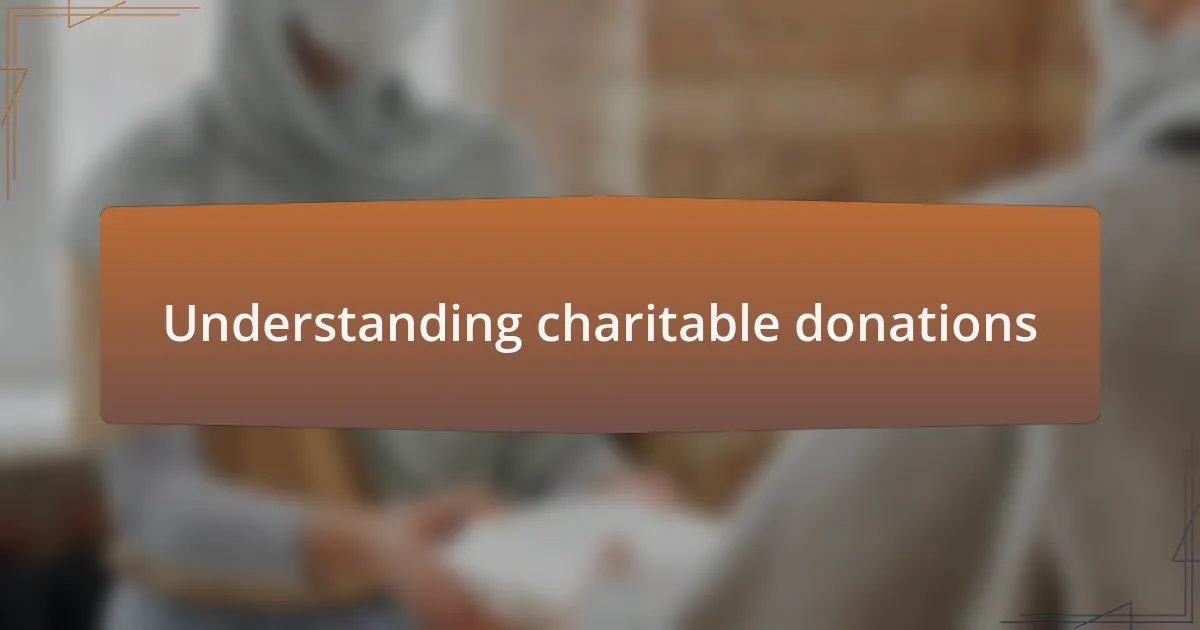
Understanding charitable donations
Charitable donations are often driven by a mix of compassion and personal experience. For instance, I remember the moment I first witnessed the impact of a small donation. A local charity helped a family in my neighborhood, and the sheer gratitude reflected on their faces made me realize how those seemingly small contributions could create waves of change. It’s a reminder that every bit counts, isn’t it?
What truly fascinates me is the variety of motivations behind donations. Some people give to honor a loved one, while others are moved by a specific cause that resonates with them deeply. I once met someone who donated in memory of a friend’s battle with cancer. That story struck me; it highlighted how personal experiences can inspire generosity. What drives you to give?
It’s also important to understand that charitable donations extend beyond just financial support. Many donors feel a sense of belonging and purpose when contributing. I’ve found that some individuals engage more deeply with causes by volunteering their time and skills instead of, or in addition to, monetary donations. This illustrates that philanthropy is not simply about money; it’s about creating meaningful connections and making a tangible difference in the community.
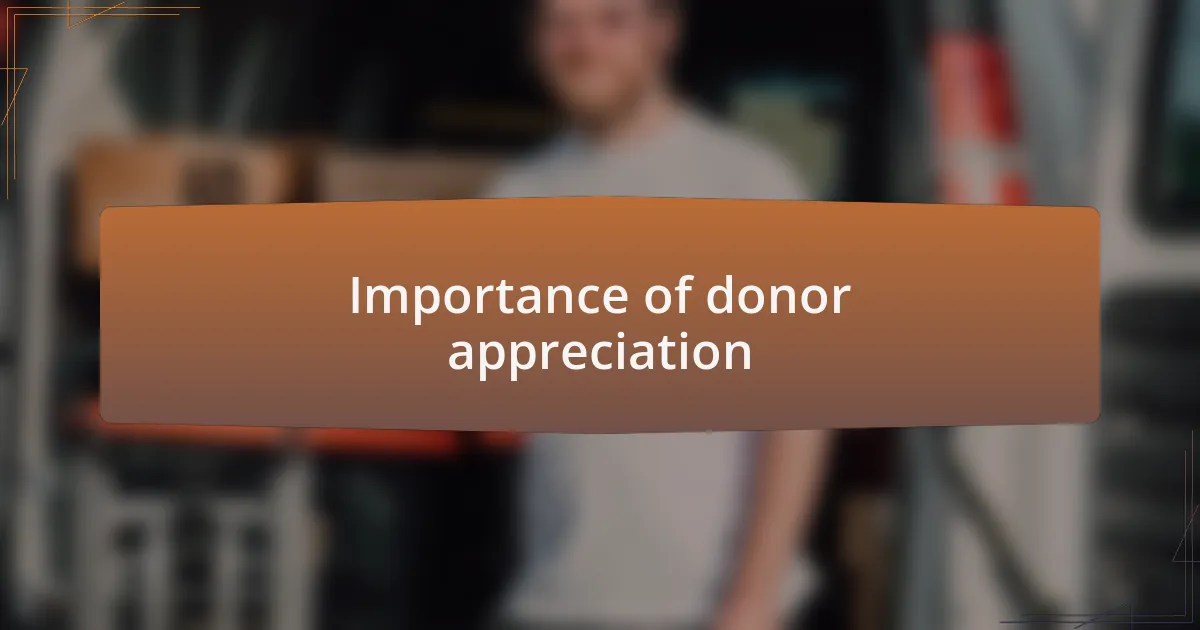
Importance of donor appreciation
Donor appreciation plays a pivotal role in fostering long-term relationships between charities and their supporters. I recall a charity I volunteered for that made it a point to send handwritten thank-you notes after each donation. The heartfelt response from donors made a noticeable difference; not only did it show gratitude, but it also made them feel valued as partners in the mission. How would a simple thank-you change your perspective on giving?
Moreover, acknowledging donor contributions helps to cultivate a positive giving culture. I remember attending a donor appreciation event where stories were shared about the impact of our collective contributions. It was moving to hear firsthand accounts of how those donations transformed lives. Such recognition not only lifts spirits but fosters a sense of community around the cause.
Finally, donor appreciation can significantly influence future giving. When donors feel appreciated, they are more likely to continue their support, both financially and through advocacy. I once met a donor who said that after receiving a personalized thank-you call, they were inspired to increase their contributions. Isn’t it fascinating how a simple expression of gratitude can lead to greater generosity?
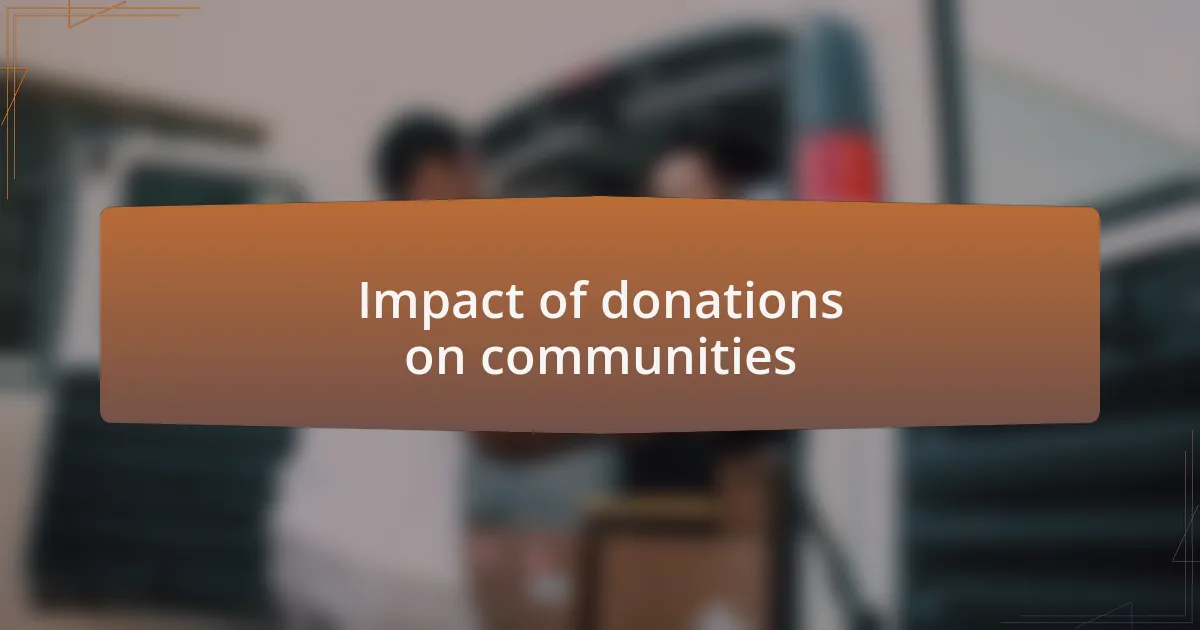
Impact of donations on communities
The impact of donations on communities is often profound and far-reaching. I remember volunteering in a neighborhood where a small donation funded a community garden. This garden not only provided fresh produce but also brought neighbors together, fostering relationships and creating a shared sense of pride in our environment. How can something as simple as a few dollars transform a community’s dynamics?
Each contribution, no matter the size, has the potential to change lives. I once met a single mother who received support from a local organization funded by donations. She shared how the assistance allowed her to pursue further education, ultimately leading to a stable job and a better future for her children. It’s incredible to witness the ripple effect of kindness—donations empower individuals and uplift entire families.
Moreover, in times of crisis, the role of donations becomes even more critical. During a recent natural disaster, I saw how quickly local organizations mobilized resources thanks to the generosity of donors. Supply drives, emotional support services, and even safe spaces were established almost overnight. Isn’t it inspiring to think that your contribution could help someone rebuild their life after a setback?
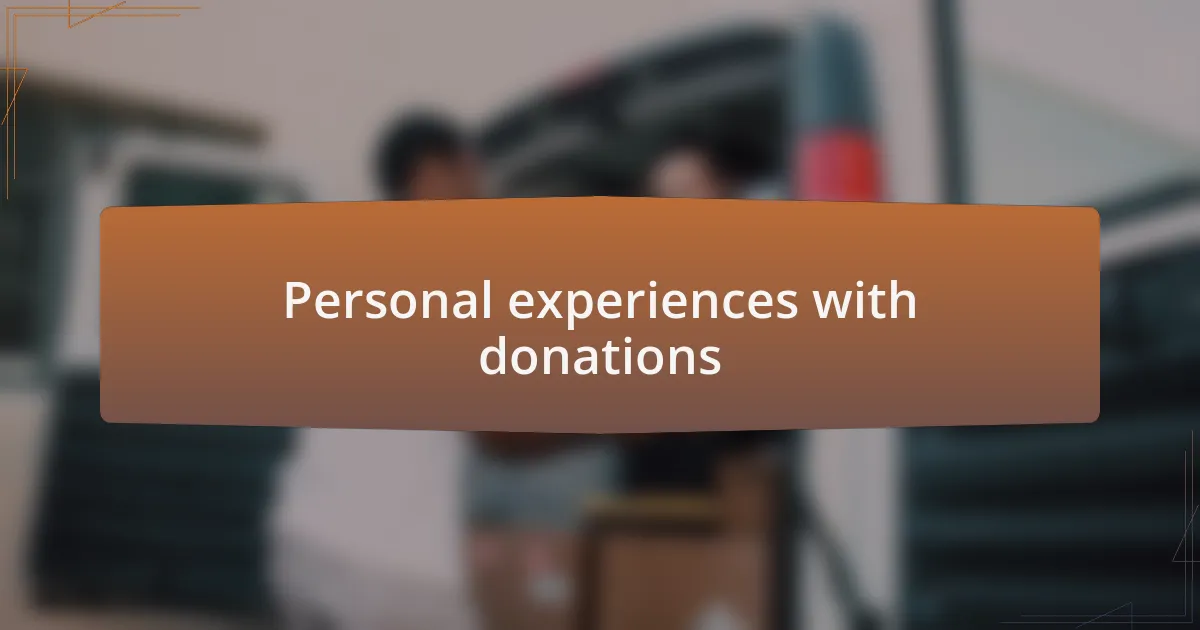
Personal experiences with donations
When I think about my own experiences with donations, a particular moment stands out. I remember attending a fundraiser where everyone shared their stories, revealing the immense impact of support they had received. Listening to a child recount how a scholarship changed their life left me in tears. Isn’t it amazing how a gift can alter someone’s path so dramatically?
Another time, I found myself in a shelter, organizing donated clothes. The gratitude expressed by those receiving them was palpable; it was heartwarming yet heartbreaking. Seeing someone’s face light up over a simple coat reminded me of the power of even the smallest contributions. How can we underestimate the warmth that a thoughtful gift can bring?
There was also a day when I was part of a campaign to raise funds for medical equipment in a local hospital. As I interacted with families impacted by illnesses, their hope and desperation were evident. Knowing that our collective efforts could lead to better care for loved ones made every ounce of effort feel worthwhile. Isn’t it powerful to think that our engagement can be a source of strength for those in dire situations?
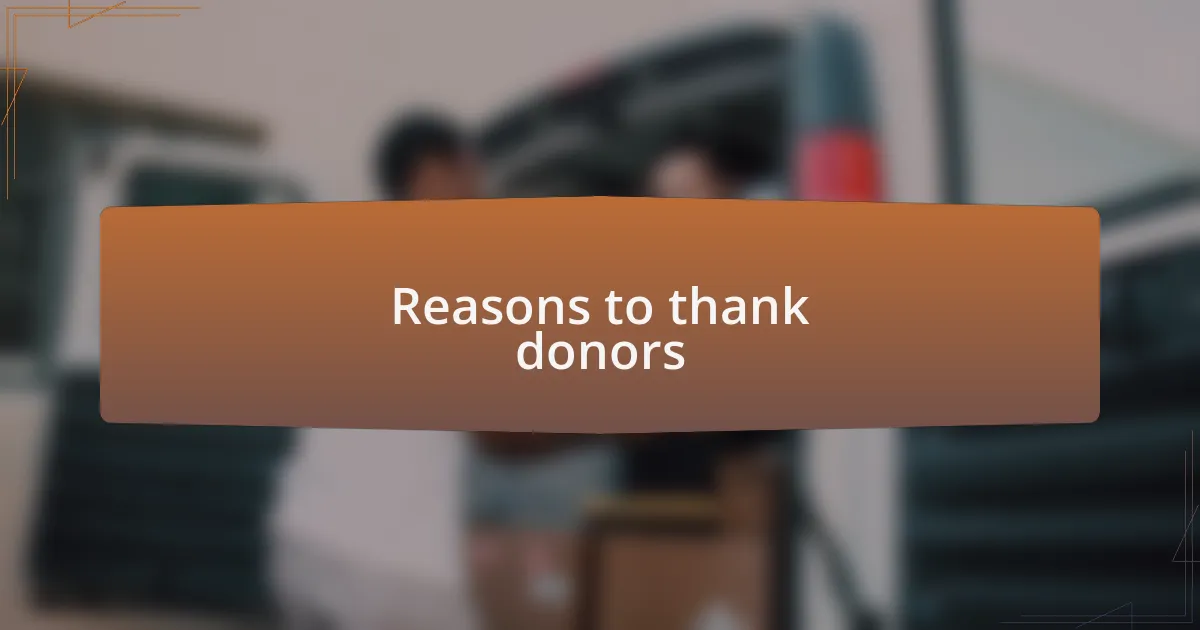
Reasons to thank donors
Showing gratitude to donors is pivotal because it acknowledges their generosity and reinforces a positive relationship. I recall once sending a handwritten note to a donor who contributed to our food pantry. The recipient of their donation later shared how it alleviated their family’s financial stress. Knowing that my thank-you note conveyed real stories made the donor feel connected to the impact of their gift—it really brought the donation full circle.
Furthermore, appreciating donors fosters a sense of community and belonging. I’ve seen firsthand how a simple thank-you leads to more engagement. At one event, a longtime supporter approached me to express how much it meant to them to receive recognition for their commitment. Isn’t it fascinating how a few words can motivate someone to stay involved for years to come?
Ultimately, thanking donors not only encourages repeated donations but also inspires others to act. I once attended a gathering where we celebrated our biggest supporters. Their smiles and genuine appreciation for the recognition created a ripple effect, inspiring others to donate. How often do we consider that gratitude can be a powerful tool in galvanizing support for a cause we believe in?
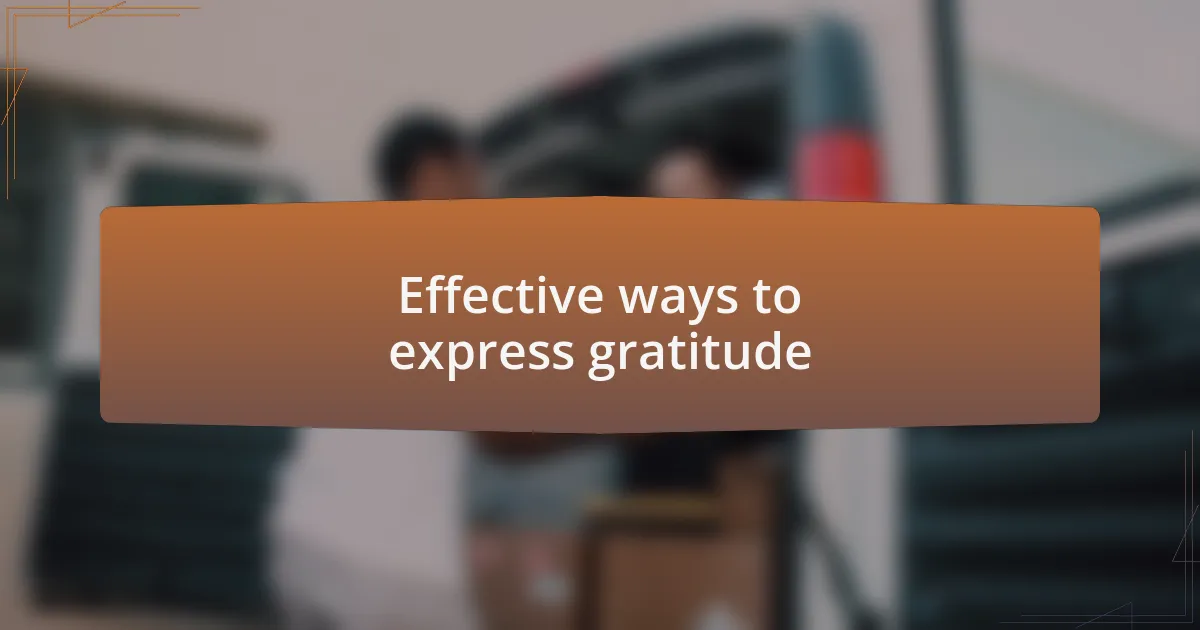
Effective ways to express gratitude
One of the most effective ways to express gratitude is through personalized thank-you notes that reflect the donor’s impact. I once penned a brief message detailing how a donor’s contribution directly funded a scholarship for a local student. The response was heartfelt; they shared that knowing their money changed a life was far more rewarding than simply receiving a generic acknowledgment. Isn’t it remarkable how customized communication can elevate the sentiment of gratitude?
Events also provide a unique opportunity to show appreciation. During an annual gala, I took the time to spotlight individual donors and their contributions in my speech. Seeing their faces light up as they were recognized created an incredible atmosphere of belonging. Have you ever noticed how being publicly honored can motivate people to deepen their commitment to a cause?
Lastly, leveraging social media to thank donors can extend the reach of your appreciation. I remember creating a post highlighting a donor’s generous support, complete with a photo and text detailing the positive change they inspired. The donor expressed sheer joy and shared the post with their network, amplifying the message of gratitude to a broader audience. How often do we tap into the power of social platforms to spread appreciation and foster community engagement?
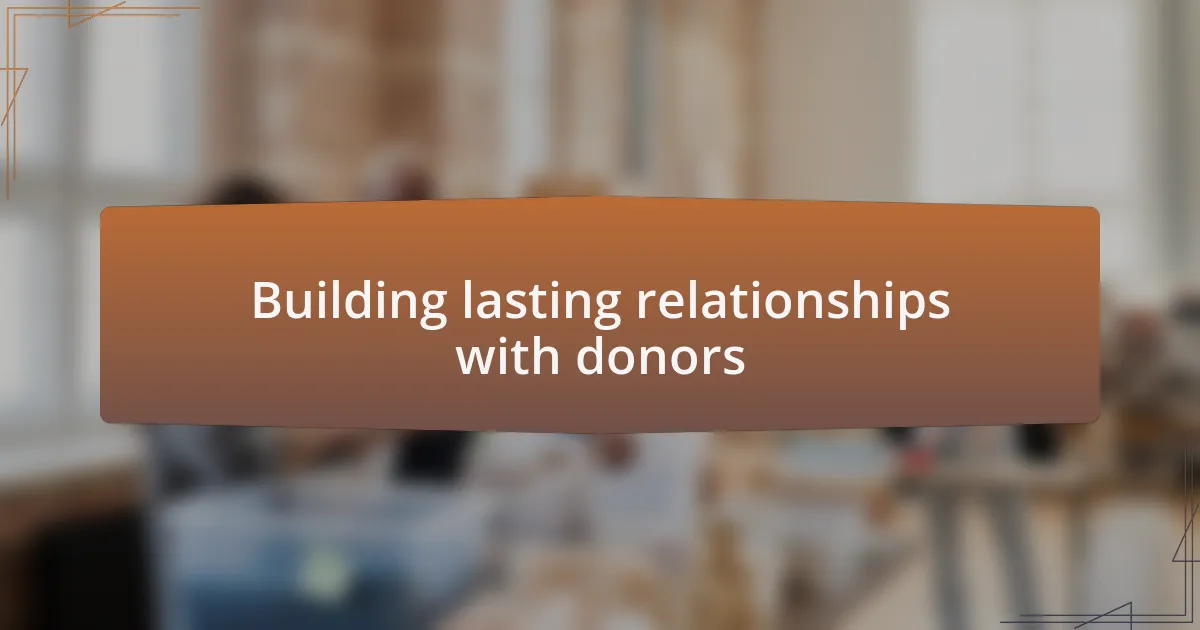
Building lasting relationships with donors
Establishing a genuine connection with donors is crucial for nurturing lasting relationships. I remember a time when I invited a small group of donors for a behind-the-scenes tour of our organization. As we walked through the programs their contributions supported, I could see their pride and investment deepen. It struck me that sharing our mission and seeing the tangible results of their efforts transformed casual donors into passionate advocates.
Communication shouldn’t end after a donation is made; it’s just the beginning. I’ve always made it a point to follow up with donors regularly, not only to update them on our progress but also to share personal stories of those who have benefited from their generosity. I’ve found that these shared moments foster an emotional bond, making every donation feel like an ongoing partnership. Have you ever considered how a simple phone call or a coffee meeting could turn a one-time donor into a lifelong supporter?
Creating an inclusive environment where donors feel valued is vital for relationship-building. I once held a brainstorming session where donors could share their thoughts and ideas about future initiatives. The enthusiasm in the room was palpable, and knowing that their insights contributed to the future direction of our work resonated with everyone. Isn’t it incredible how involving donors in the decision-making process can strengthen their commitment to our cause?